Legal Analysis of Contract Formation and Company Liability
VerifiedAdded on 2022/10/17
|6
|1753
|413
Homework Assignment
AI Summary
This document presents a detailed analysis of two legal cases concerning contract formation and validity under the Corporations Act 2001. The first case involves Motorbike Pty Ltd, where the central issue is whether the company can withdraw from a contract to purchase a bike. The analysis applies Section 127 of the Corporations Act, which outlines the requirements for valid contract formation, emphasizing the need for signatures from a director and company secretary. The second case involves Cakes Pty Ltd, focusing on whether a contract for the company's purchase is valid when signed only by the director and witnessed by others, but not properly executed as per the Act. The analysis references the case of Knight Frank Australia Pty Ltd v Paley Properties Pty Ltd, highlighting the consequences of improper contract execution. The document concludes that the contract in the first case is valid and the company cannot revoke it, while the contract in the second case might be invalid due to the improper signing. The document also includes a reference list of legal resources.
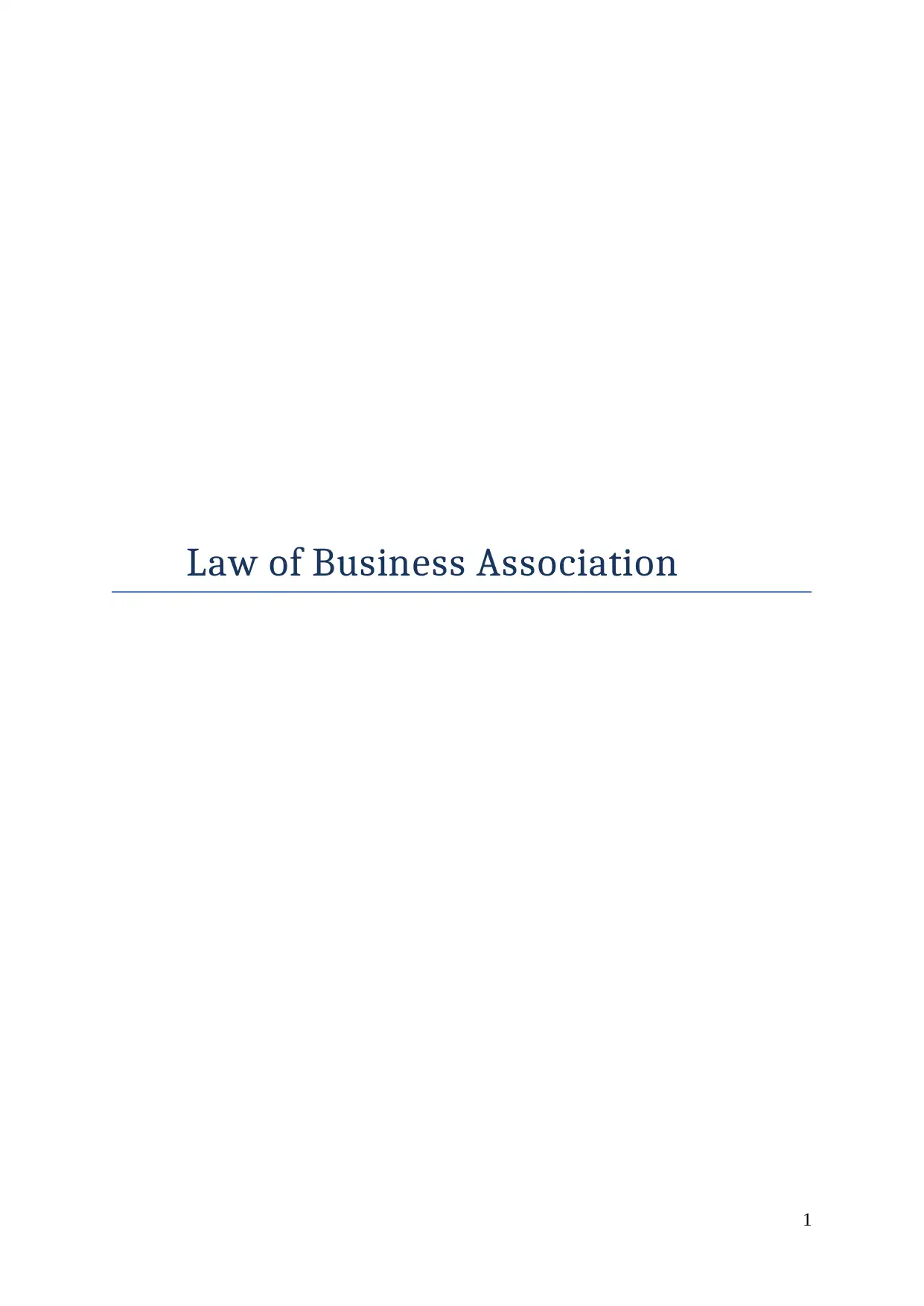
Law of Business Association
1
1
Paraphrase This Document
Need a fresh take? Get an instant paraphrase of this document with our AI Paraphraser
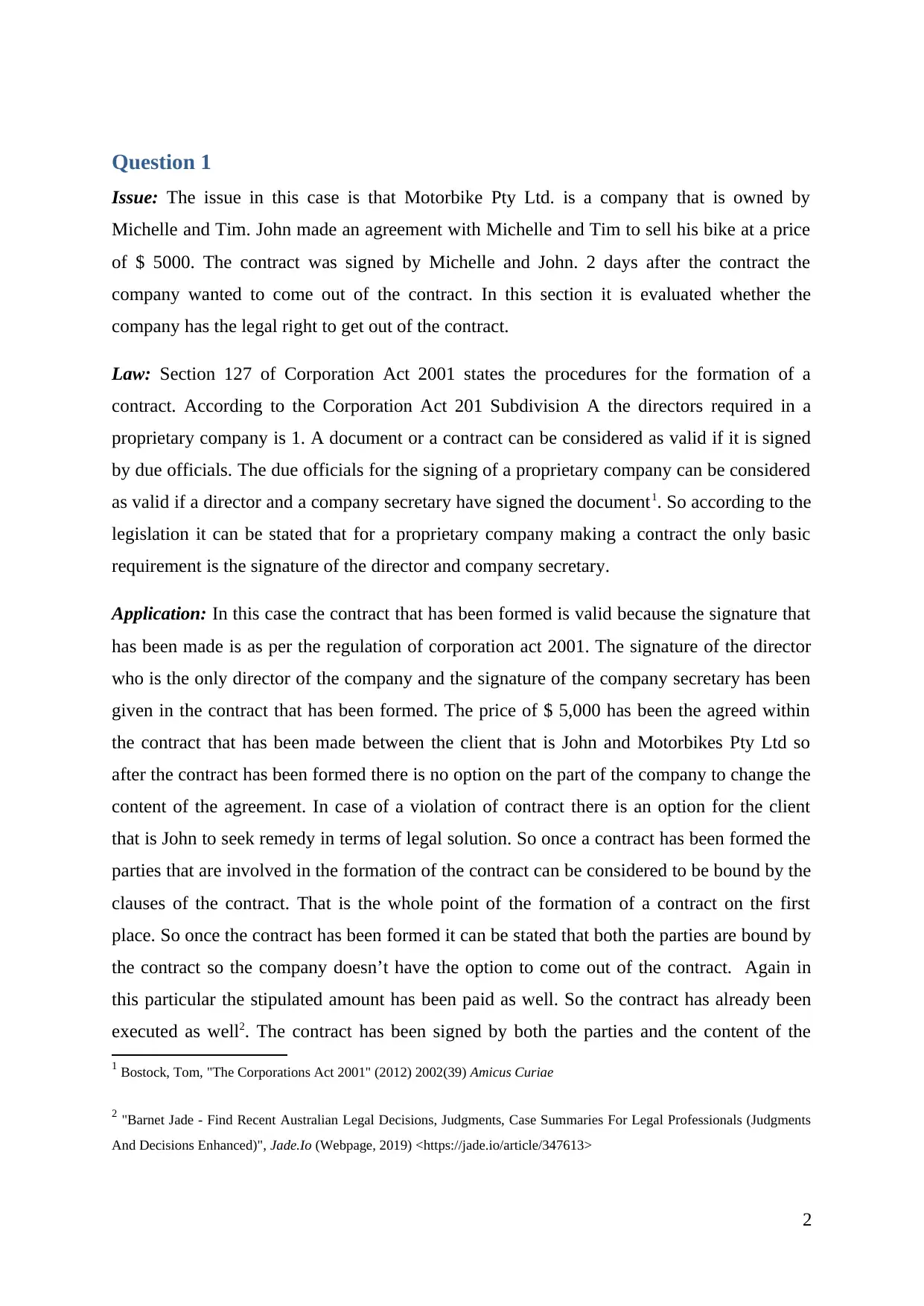
Question 1
Issue: The issue in this case is that Motorbike Pty Ltd. is a company that is owned by
Michelle and Tim. John made an agreement with Michelle and Tim to sell his bike at a price
of $ 5000. The contract was signed by Michelle and John. 2 days after the contract the
company wanted to come out of the contract. In this section it is evaluated whether the
company has the legal right to get out of the contract.
Law: Section 127 of Corporation Act 2001 states the procedures for the formation of a
contract. According to the Corporation Act 201 Subdivision A the directors required in a
proprietary company is 1. A document or a contract can be considered as valid if it is signed
by due officials. The due officials for the signing of a proprietary company can be considered
as valid if a director and a company secretary have signed the document1. So according to the
legislation it can be stated that for a proprietary company making a contract the only basic
requirement is the signature of the director and company secretary.
Application: In this case the contract that has been formed is valid because the signature that
has been made is as per the regulation of corporation act 2001. The signature of the director
who is the only director of the company and the signature of the company secretary has been
given in the contract that has been formed. The price of $ 5,000 has been the agreed within
the contract that has been made between the client that is John and Motorbikes Pty Ltd so
after the contract has been formed there is no option on the part of the company to change the
content of the agreement. In case of a violation of contract there is an option for the client
that is John to seek remedy in terms of legal solution. So once a contract has been formed the
parties that are involved in the formation of the contract can be considered to be bound by the
clauses of the contract. That is the whole point of the formation of a contract on the first
place. So once the contract has been formed it can be stated that both the parties are bound by
the contract so the company doesn’t have the option to come out of the contract. Again in
this particular the stipulated amount has been paid as well. So the contract has already been
executed as well2. The contract has been signed by both the parties and the content of the
1 Bostock, Tom, "The Corporations Act 2001" (2012) 2002(39) Amicus Curiae
2 "Barnet Jade - Find Recent Australian Legal Decisions, Judgments, Case Summaries For Legal Professionals (Judgments
And Decisions Enhanced)", Jade.Io (Webpage, 2019) <https://jade.io/article/347613>
2
Issue: The issue in this case is that Motorbike Pty Ltd. is a company that is owned by
Michelle and Tim. John made an agreement with Michelle and Tim to sell his bike at a price
of $ 5000. The contract was signed by Michelle and John. 2 days after the contract the
company wanted to come out of the contract. In this section it is evaluated whether the
company has the legal right to get out of the contract.
Law: Section 127 of Corporation Act 2001 states the procedures for the formation of a
contract. According to the Corporation Act 201 Subdivision A the directors required in a
proprietary company is 1. A document or a contract can be considered as valid if it is signed
by due officials. The due officials for the signing of a proprietary company can be considered
as valid if a director and a company secretary have signed the document1. So according to the
legislation it can be stated that for a proprietary company making a contract the only basic
requirement is the signature of the director and company secretary.
Application: In this case the contract that has been formed is valid because the signature that
has been made is as per the regulation of corporation act 2001. The signature of the director
who is the only director of the company and the signature of the company secretary has been
given in the contract that has been formed. The price of $ 5,000 has been the agreed within
the contract that has been made between the client that is John and Motorbikes Pty Ltd so
after the contract has been formed there is no option on the part of the company to change the
content of the agreement. In case of a violation of contract there is an option for the client
that is John to seek remedy in terms of legal solution. So once a contract has been formed the
parties that are involved in the formation of the contract can be considered to be bound by the
clauses of the contract. That is the whole point of the formation of a contract on the first
place. So once the contract has been formed it can be stated that both the parties are bound by
the contract so the company doesn’t have the option to come out of the contract. Again in
this particular the stipulated amount has been paid as well. So the contract has already been
executed as well2. The contract has been signed by both the parties and the content of the
1 Bostock, Tom, "The Corporations Act 2001" (2012) 2002(39) Amicus Curiae
2 "Barnet Jade - Find Recent Australian Legal Decisions, Judgments, Case Summaries For Legal Professionals (Judgments
And Decisions Enhanced)", Jade.Io (Webpage, 2019) <https://jade.io/article/347613>
2
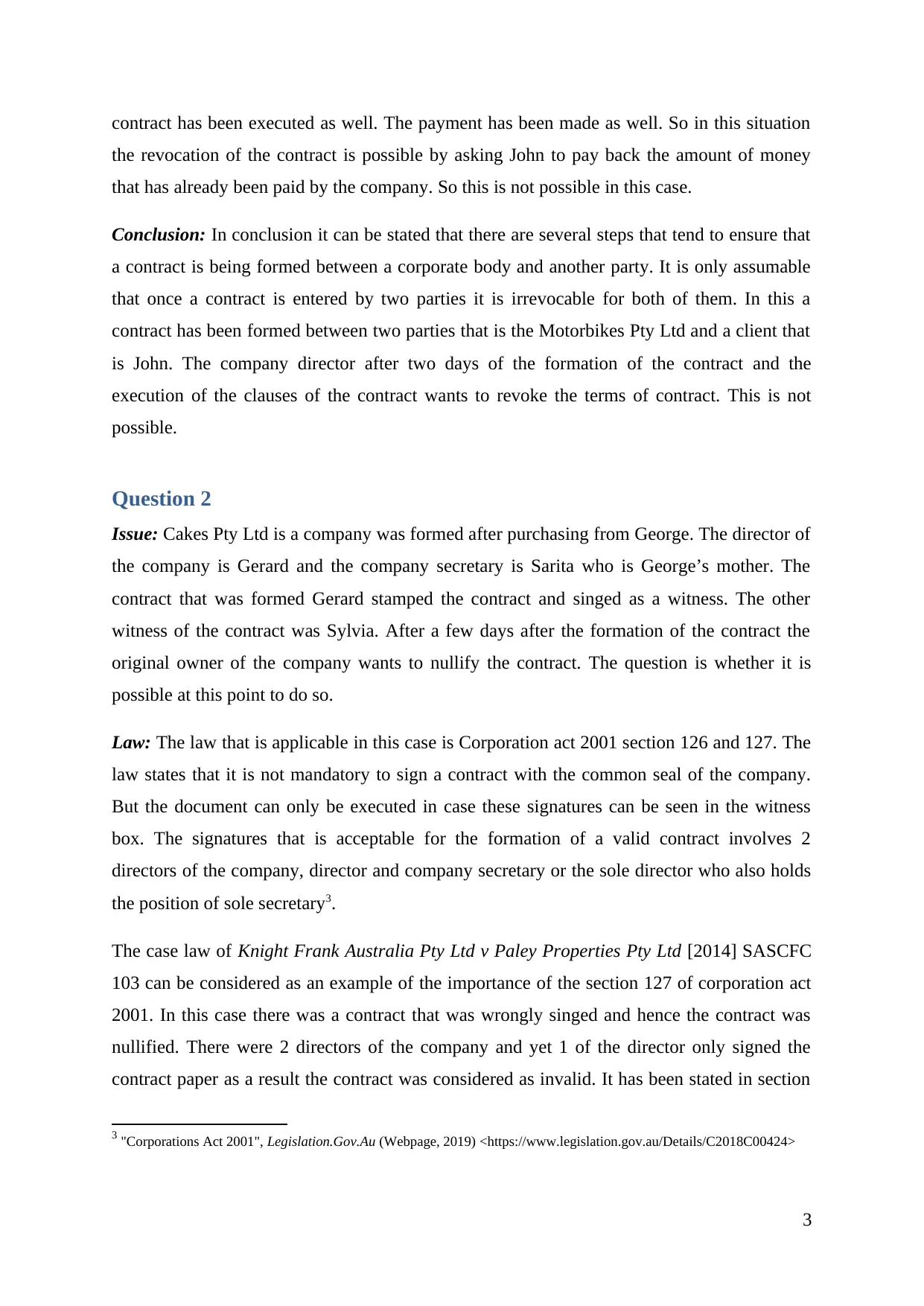
contract has been executed as well. The payment has been made as well. So in this situation
the revocation of the contract is possible by asking John to pay back the amount of money
that has already been paid by the company. So this is not possible in this case.
Conclusion: In conclusion it can be stated that there are several steps that tend to ensure that
a contract is being formed between a corporate body and another party. It is only assumable
that once a contract is entered by two parties it is irrevocable for both of them. In this a
contract has been formed between two parties that is the Motorbikes Pty Ltd and a client that
is John. The company director after two days of the formation of the contract and the
execution of the clauses of the contract wants to revoke the terms of contract. This is not
possible.
Question 2
Issue: Cakes Pty Ltd is a company was formed after purchasing from George. The director of
the company is Gerard and the company secretary is Sarita who is George’s mother. The
contract that was formed Gerard stamped the contract and singed as a witness. The other
witness of the contract was Sylvia. After a few days after the formation of the contract the
original owner of the company wants to nullify the contract. The question is whether it is
possible at this point to do so.
Law: The law that is applicable in this case is Corporation act 2001 section 126 and 127. The
law states that it is not mandatory to sign a contract with the common seal of the company.
But the document can only be executed in case these signatures can be seen in the witness
box. The signatures that is acceptable for the formation of a valid contract involves 2
directors of the company, director and company secretary or the sole director who also holds
the position of sole secretary3.
The case law of Knight Frank Australia Pty Ltd v Paley Properties Pty Ltd [2014] SASCFC
103 can be considered as an example of the importance of the section 127 of corporation act
2001. In this case there was a contract that was wrongly singed and hence the contract was
nullified. There were 2 directors of the company and yet 1 of the director only signed the
contract paper as a result the contract was considered as invalid. It has been stated in section
3 "Corporations Act 2001", Legislation.Gov.Au (Webpage, 2019) <https://www.legislation.gov.au/Details/C2018C00424>
3
the revocation of the contract is possible by asking John to pay back the amount of money
that has already been paid by the company. So this is not possible in this case.
Conclusion: In conclusion it can be stated that there are several steps that tend to ensure that
a contract is being formed between a corporate body and another party. It is only assumable
that once a contract is entered by two parties it is irrevocable for both of them. In this a
contract has been formed between two parties that is the Motorbikes Pty Ltd and a client that
is John. The company director after two days of the formation of the contract and the
execution of the clauses of the contract wants to revoke the terms of contract. This is not
possible.
Question 2
Issue: Cakes Pty Ltd is a company was formed after purchasing from George. The director of
the company is Gerard and the company secretary is Sarita who is George’s mother. The
contract that was formed Gerard stamped the contract and singed as a witness. The other
witness of the contract was Sylvia. After a few days after the formation of the contract the
original owner of the company wants to nullify the contract. The question is whether it is
possible at this point to do so.
Law: The law that is applicable in this case is Corporation act 2001 section 126 and 127. The
law states that it is not mandatory to sign a contract with the common seal of the company.
But the document can only be executed in case these signatures can be seen in the witness
box. The signatures that is acceptable for the formation of a valid contract involves 2
directors of the company, director and company secretary or the sole director who also holds
the position of sole secretary3.
The case law of Knight Frank Australia Pty Ltd v Paley Properties Pty Ltd [2014] SASCFC
103 can be considered as an example of the importance of the section 127 of corporation act
2001. In this case there was a contract that was wrongly singed and hence the contract was
nullified. There were 2 directors of the company and yet 1 of the director only signed the
contract paper as a result the contract was considered as invalid. It has been stated in section
3 "Corporations Act 2001", Legislation.Gov.Au (Webpage, 2019) <https://www.legislation.gov.au/Details/C2018C00424>
3
⊘ This is a preview!⊘
Do you want full access?
Subscribe today to unlock all pages.

Trusted by 1+ million students worldwide
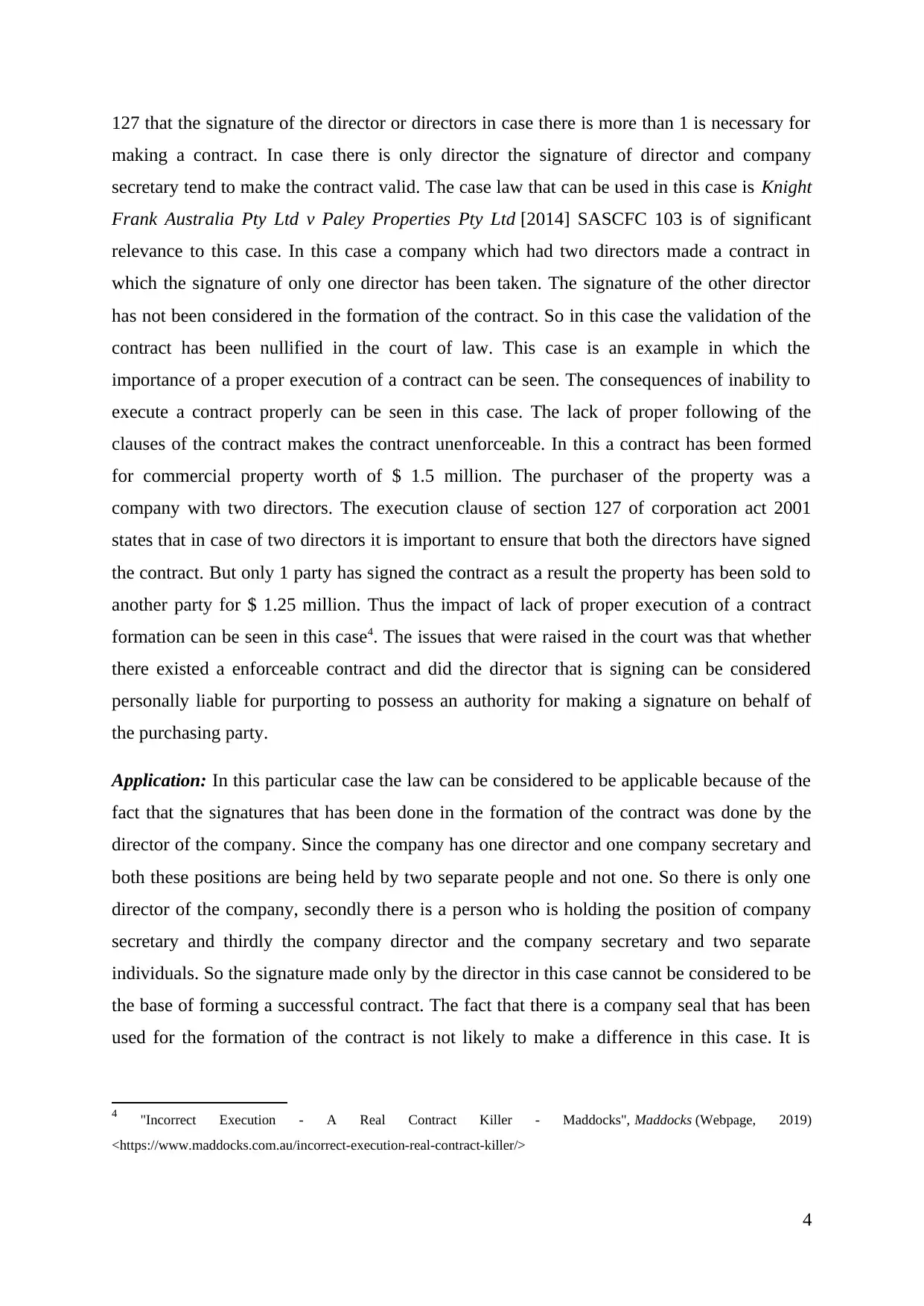
127 that the signature of the director or directors in case there is more than 1 is necessary for
making a contract. In case there is only director the signature of director and company
secretary tend to make the contract valid. The case law that can be used in this case is Knight
Frank Australia Pty Ltd v Paley Properties Pty Ltd [2014] SASCFC 103 is of significant
relevance to this case. In this case a company which had two directors made a contract in
which the signature of only one director has been taken. The signature of the other director
has not been considered in the formation of the contract. So in this case the validation of the
contract has been nullified in the court of law. This case is an example in which the
importance of a proper execution of a contract can be seen. The consequences of inability to
execute a contract properly can be seen in this case. The lack of proper following of the
clauses of the contract makes the contract unenforceable. In this a contract has been formed
for commercial property worth of $ 1.5 million. The purchaser of the property was a
company with two directors. The execution clause of section 127 of corporation act 2001
states that in case of two directors it is important to ensure that both the directors have signed
the contract. But only 1 party has signed the contract as a result the property has been sold to
another party for $ 1.25 million. Thus the impact of lack of proper execution of a contract
formation can be seen in this case4. The issues that were raised in the court was that whether
there existed a enforceable contract and did the director that is signing can be considered
personally liable for purporting to possess an authority for making a signature on behalf of
the purchasing party.
Application: In this particular case the law can be considered to be applicable because of the
fact that the signatures that has been done in the formation of the contract was done by the
director of the company. Since the company has one director and one company secretary and
both these positions are being held by two separate people and not one. So there is only one
director of the company, secondly there is a person who is holding the position of company
secretary and thirdly the company director and the company secretary and two separate
individuals. So the signature made only by the director in this case cannot be considered to be
the base of forming a successful contract. The fact that there is a company seal that has been
used for the formation of the contract is not likely to make a difference in this case. It is
4 "Incorrect Execution - A Real Contract Killer - Maddocks", Maddocks (Webpage, 2019)
<https://www.maddocks.com.au/incorrect-execution-real-contract-killer/>
4
making a contract. In case there is only director the signature of director and company
secretary tend to make the contract valid. The case law that can be used in this case is Knight
Frank Australia Pty Ltd v Paley Properties Pty Ltd [2014] SASCFC 103 is of significant
relevance to this case. In this case a company which had two directors made a contract in
which the signature of only one director has been taken. The signature of the other director
has not been considered in the formation of the contract. So in this case the validation of the
contract has been nullified in the court of law. This case is an example in which the
importance of a proper execution of a contract can be seen. The consequences of inability to
execute a contract properly can be seen in this case. The lack of proper following of the
clauses of the contract makes the contract unenforceable. In this a contract has been formed
for commercial property worth of $ 1.5 million. The purchaser of the property was a
company with two directors. The execution clause of section 127 of corporation act 2001
states that in case of two directors it is important to ensure that both the directors have signed
the contract. But only 1 party has signed the contract as a result the property has been sold to
another party for $ 1.25 million. Thus the impact of lack of proper execution of a contract
formation can be seen in this case4. The issues that were raised in the court was that whether
there existed a enforceable contract and did the director that is signing can be considered
personally liable for purporting to possess an authority for making a signature on behalf of
the purchasing party.
Application: In this particular case the law can be considered to be applicable because of the
fact that the signatures that has been done in the formation of the contract was done by the
director of the company. Since the company has one director and one company secretary and
both these positions are being held by two separate people and not one. So there is only one
director of the company, secondly there is a person who is holding the position of company
secretary and thirdly the company director and the company secretary and two separate
individuals. So the signature made only by the director in this case cannot be considered to be
the base of forming a successful contract. The fact that there is a company seal that has been
used for the formation of the contract is not likely to make a difference in this case. It is
4 "Incorrect Execution - A Real Contract Killer - Maddocks", Maddocks (Webpage, 2019)
<https://www.maddocks.com.au/incorrect-execution-real-contract-killer/>
4
Paraphrase This Document
Need a fresh take? Get an instant paraphrase of this document with our AI Paraphraser
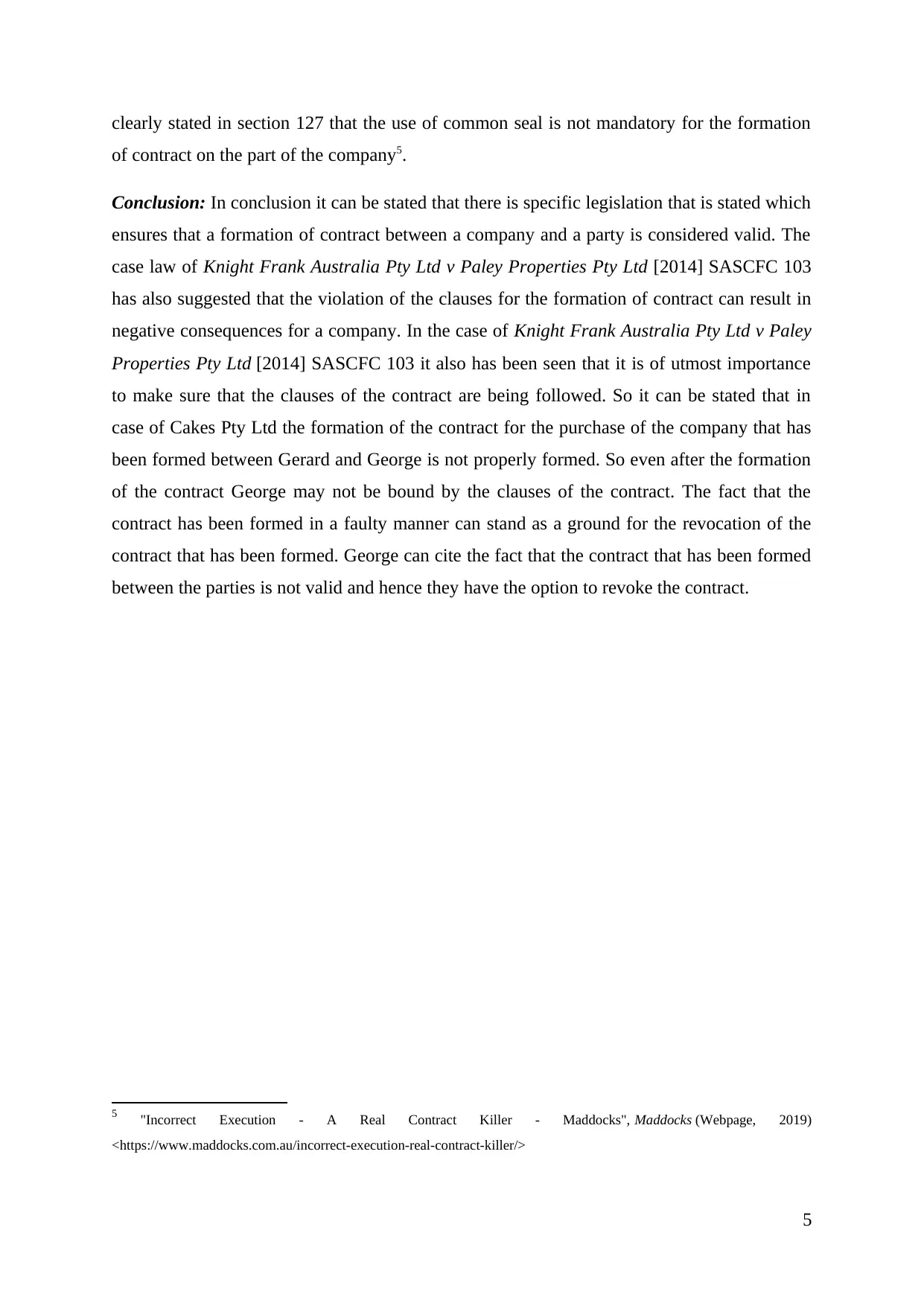
clearly stated in section 127 that the use of common seal is not mandatory for the formation
of contract on the part of the company5.
Conclusion: In conclusion it can be stated that there is specific legislation that is stated which
ensures that a formation of contract between a company and a party is considered valid. The
case law of Knight Frank Australia Pty Ltd v Paley Properties Pty Ltd [2014] SASCFC 103
has also suggested that the violation of the clauses for the formation of contract can result in
negative consequences for a company. In the case of Knight Frank Australia Pty Ltd v Paley
Properties Pty Ltd [2014] SASCFC 103 it also has been seen that it is of utmost importance
to make sure that the clauses of the contract are being followed. So it can be stated that in
case of Cakes Pty Ltd the formation of the contract for the purchase of the company that has
been formed between Gerard and George is not properly formed. So even after the formation
of the contract George may not be bound by the clauses of the contract. The fact that the
contract has been formed in a faulty manner can stand as a ground for the revocation of the
contract that has been formed. George can cite the fact that the contract that has been formed
between the parties is not valid and hence they have the option to revoke the contract.
5 "Incorrect Execution - A Real Contract Killer - Maddocks", Maddocks (Webpage, 2019)
<https://www.maddocks.com.au/incorrect-execution-real-contract-killer/>
5
of contract on the part of the company5.
Conclusion: In conclusion it can be stated that there is specific legislation that is stated which
ensures that a formation of contract between a company and a party is considered valid. The
case law of Knight Frank Australia Pty Ltd v Paley Properties Pty Ltd [2014] SASCFC 103
has also suggested that the violation of the clauses for the formation of contract can result in
negative consequences for a company. In the case of Knight Frank Australia Pty Ltd v Paley
Properties Pty Ltd [2014] SASCFC 103 it also has been seen that it is of utmost importance
to make sure that the clauses of the contract are being followed. So it can be stated that in
case of Cakes Pty Ltd the formation of the contract for the purchase of the company that has
been formed between Gerard and George is not properly formed. So even after the formation
of the contract George may not be bound by the clauses of the contract. The fact that the
contract has been formed in a faulty manner can stand as a ground for the revocation of the
contract that has been formed. George can cite the fact that the contract that has been formed
between the parties is not valid and hence they have the option to revoke the contract.
5 "Incorrect Execution - A Real Contract Killer - Maddocks", Maddocks (Webpage, 2019)
<https://www.maddocks.com.au/incorrect-execution-real-contract-killer/>
5
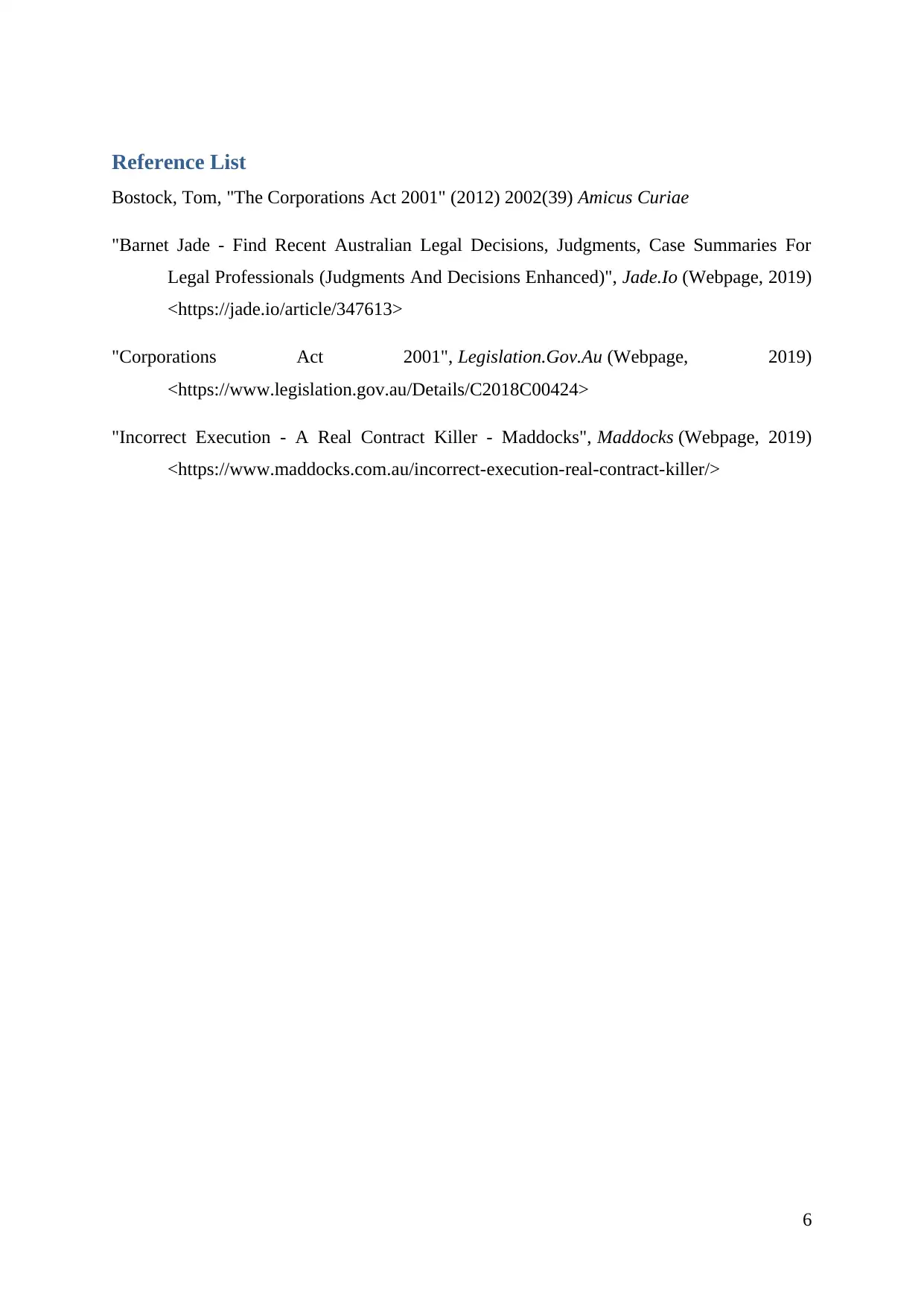
Reference List
Bostock, Tom, "The Corporations Act 2001" (2012) 2002(39) Amicus Curiae
"Barnet Jade - Find Recent Australian Legal Decisions, Judgments, Case Summaries For
Legal Professionals (Judgments And Decisions Enhanced)", Jade.Io (Webpage, 2019)
<https://jade.io/article/347613>
"Corporations Act 2001", Legislation.Gov.Au (Webpage, 2019)
<https://www.legislation.gov.au/Details/C2018C00424>
"Incorrect Execution - A Real Contract Killer - Maddocks", Maddocks (Webpage, 2019)
<https://www.maddocks.com.au/incorrect-execution-real-contract-killer/>
6
Bostock, Tom, "The Corporations Act 2001" (2012) 2002(39) Amicus Curiae
"Barnet Jade - Find Recent Australian Legal Decisions, Judgments, Case Summaries For
Legal Professionals (Judgments And Decisions Enhanced)", Jade.Io (Webpage, 2019)
<https://jade.io/article/347613>
"Corporations Act 2001", Legislation.Gov.Au (Webpage, 2019)
<https://www.legislation.gov.au/Details/C2018C00424>
"Incorrect Execution - A Real Contract Killer - Maddocks", Maddocks (Webpage, 2019)
<https://www.maddocks.com.au/incorrect-execution-real-contract-killer/>
6
⊘ This is a preview!⊘
Do you want full access?
Subscribe today to unlock all pages.

Trusted by 1+ million students worldwide
1 out of 6
Related Documents
Your All-in-One AI-Powered Toolkit for Academic Success.
+13062052269
info@desklib.com
Available 24*7 on WhatsApp / Email
![[object Object]](/_next/static/media/star-bottom.7253800d.svg)
Unlock your academic potential
Copyright © 2020–2026 A2Z Services. All Rights Reserved. Developed and managed by ZUCOL.





